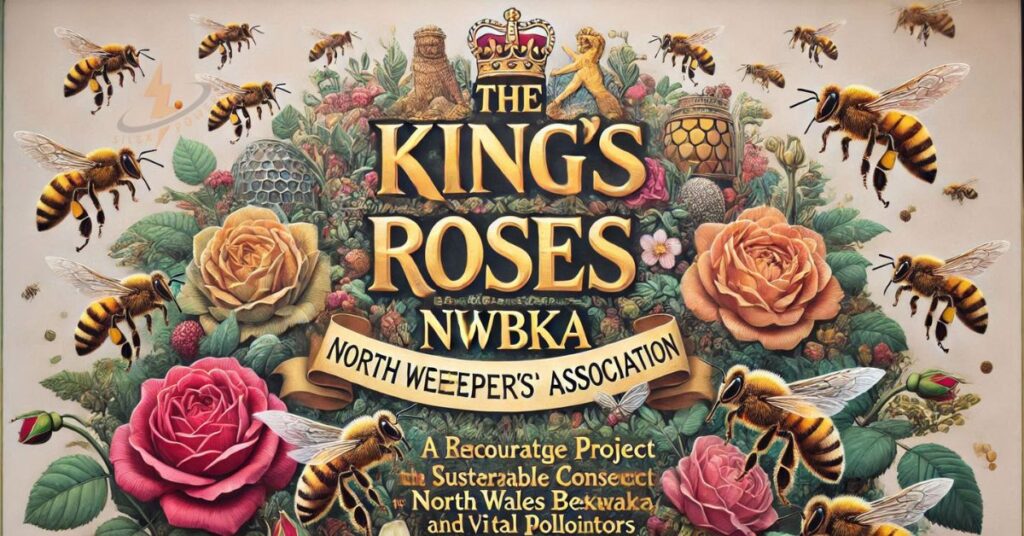Introduction:
Located in the tranquil surroundings of North Wales, The King’s Roses NWBKA stands out as a symbol of environmental preservation, sustainability, and legacy. This project, led by the North Wales Beekeepers’ Association (NWBKA), demonstrates the interconnectedness of history, nature, and community service. It is dedicated to supporting biodiversity, sustainable beekeeping, and historical preservation while paying homage to the beauty of royal gardens and the vital role pollinators play.
The Vision Behind The King’s Roses NWBKA
The roses of the King NWBKA is a symbolic depiction of the relationship between history, floral beauty, and the preservation of important ecosystems; it is not simply about beekeeping. Through the integration of sustainable beekeeping and horticultural methods, this project highlights:
- Promoting environmentally friendly methods to preserve honeybee populations is known as “sustainable beekeeping.”
- Increasing understanding of the role pollinators play in biodiversity is known as pollinator conservation.
- Historical Preservation honoring the War of the Roses’ influence on English culture.
- Promoting local involvement to cultivate environmental stewardship is known as “community engagement.”
Through a combination of sustainability, education, and history, The King’s Roses NWBKA develops a multifaceted strategy to tackle contemporary environmental issues.
Historical Inspiration: The War of the Roses
The historical basis of The King’s Roses NWBKA, which is based on the War of the Roses, a series of battles between the House of Lancaster and the House of York in the 15th century, is among its most alluring features. Red and white roses, which stand for strength, rivalry, and solidarity, were chosen as the emblems of these opposing groups.
Inspired by these recognizable symbols, this initiative aims to:
- Create historical English-themed rose gardens.
- Floral arrangements can serve as a symbol of solidarity, development, and hope.
- Provide instructional opportunities to introduce historical narratives to contemporary audiences.
History is skillfully incorporated into horticulture by the King’s Roses NWBKA, enhancing its message and increasing its appeal.
The Symbiotic Relationship Between Roses and Bees
- The interesting relationship between bees and roses is at the center of The King’s Roses NWBKA. The biological connection between these two natural wonders supports biodiversity:
- Bees as Pollinators: Bees are essential to fertilization and rely on roses for pollen and nectar.
- Roses as Suppliers Bees are drawn to roses because they provide food and allow them to flourish through pollination.
Food security and the health of ecosystems depend on pollinator populations and habitat preservation, which is highlighted by this connection.
Educational Programs and Workshops
With a focus on education, the King’s Roses NWBKA empowers communities through workshops, events, and practical training. Among the important programs are
- Beekeeping Basics: introductory classes on managing hives and producing honey.
- Teaching sustainable landscaping techniques through garden design and upkeep.
- Campaigns to raise public awareness of pollinators’ significance are known as pollinator awareness campaigns.
- Activities for school youth engagement that will motivate the upcoming generation of environmentalists.
By encouraging participants to adopt eco-friendly behaviors, these programs promote lifelong learning.
Sustainability and Environmental Impact
The dedication to sustainability is a fundamental aspect of The King’s Roses NWBKA. It uses eco-friendly techniques like:
- The use of organic fertilizer cutting back on chemicals to preserve the health of the soil.
- Reducing reliance on pesticides through Integrated Pest Management (IPM).
- Encouragement of rainwater collection and effective irrigation are examples of water conservation practices.
- Establishing bee-friendly gardens with a variety of plant species is known as habitat creation.
By demonstrating sustainable techniques, this project serves as a model for conservation initiatives around the globe.
Community Involvement and Volunteerism
- The King’s Roses NWBKA’s success is largely dependent on community involvement. The project invites businesses, schools, and volunteers to participate in a range of activities, such as:
- establishing and caring for gardens.
- helping with beekeeping duties.
- holding informative exhibitions and workshops.
- supporting initiatives for awareness and fundraising.
A sense of ownership and shared responsibility for environmental protection are fostered by the program through active engagement.
Why The King’s Roses NWBKA Stands Out
The King’s Roses NWBKA is unique in that it combines conservation, horticulture, and history into one significant project. In contrast to conventional beekeeping endeavors, it:
- Blends historical accounts with current environmental issues.
- Provides breathtaking gardens that enthrall guests.
- Uses training and education to deliver practical insights.
- Encourages biodiversity by giving pollinator-friendly habitats priority.
Its multifaceted strategy guarantees broad appeal and long-term usefulness.
How You Can Get Involved
Would you like to help out with this incredible project? How you may help is as follows:
- Donate: Provide financial support to the effort in order to increase resources and programming.
- Volunteer: Volunteer to help with workshops, tend gardens, and encourage sustainability.
- Join Workshops: Study conservation, gardening, and beekeeping techniques.
- Spread Awareness: To encourage others, spread the word about the project.
All donations, no matter how modest, support this important work.
Conclusion: A Blossoming Future
The Roses of the King NWBKA is a celebration of biodiversity, sustainability, and history rather than merely a beekeeping project. It serves as a potent reminder of our need to preserve both nature and our heritage by fusing historical legacies with contemporary environmental demands.
This project exemplifies the principles of harmony, beauty, and conservation through thematic gardens, educational outreach, and sustainable practices. The King’s Roses NWBKA is a great example of how tradition and innovation can coexist to create a more sustainable and peaceful world as it expands.



